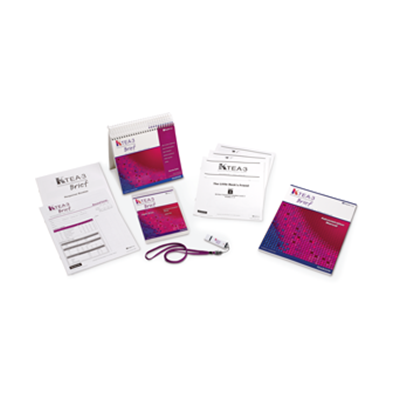Alan S. Kaufman, PhD, Nadeen L. Kaufman, PhD
Overview:Brief, individually administered measure of achievement in reading, math, and written expression.
Age Range:Individuals 4:0–25:11
Administration:Paper-and-pencil
Scoring Option:Q-global® (web-based), or manual scoring
Publication Date:2015
Quick test. Powerful results.
Introducing the new KTEA-3 Brief, for ages 4:0 – 25:11. This easy-to-administer tool yields a truly valid and reliable assessment using six core subtests from the KTEA-3 Comprehensive Form B.
Customize the test battery to suit your needs
For grade K through age 25, the KTEA-3 Brief offers two overall estimates of academic skills: a 3-subtest Brief Achievement composite (BA-3) and an Academic Skills Battery (ASB) composite. The ASB battery also yields core composites in Reading, Math, and Written Language for evaluating academic strengths and weaknesses.
For children in Pre-K, the Brief offers a Reading composite and the ASB composite.
The KTEA-3 Brief is ideal as a stand-alone screener of basic academic skills. Correlations between the BA-3 and the more comprehensive ASB composite are high (.9+) at every grade and age level. In about 20 minutes, obtain a BA-3 composite by administering just three subtests:
- Letter and Word Recognition
- Math Computation
- Spelling
If more information is needed for pre-referral, re-testing, or progress monitoring, composites for Reading, Math, and Written Language are available by administering the three additional Brief subtests:
- Reading Comprehension
- Math Concepts and Applications
- Written Expression
Apply the KTEA-3 Brief results to the Comprehensive Form
When KTEA-3 Brief results indicate that further evaluation is needed, you can incorporate the Brief standard scores when reporting results with the KTEA-3 Comprehensive Form A or Form B. No need to re-administer those subtests! Standard scores from the Brief may be used interchangeably with the subtest and composite standard scores from the Comprehensive Form.
Gain a deeper understanding of achievement gaps with the
KTEA-3 Comprehensive Form
Use this comprehensive assessment of academic skills to:
- Address additional areas of academic achievement, such as fluency in reading, writing, and math
- Yield additional composite scores, such as in Oral Language
- Identify specific skill strengths and weaknesses through error analysis
- Conduct analyses for the identification of a specific learning disability
Sample Reports
Pre-recorded Webinars
-
Academic Assessment: From Screening to Progress Monitoring
Presenter: Amy Gabel, PhD

During this webinar we will look at a practical and psychometrically sound method for utilizing the Kaufman Test of Educational Achievement, 3rd Edition to successfully screen for academic difficulties, complete a comprehensive assessment for diagnostic purposes, and ultimately monitor the progress of academic interventions and services. We will specifically highlight using the KTEA-3 Brief, KTEA-3, and Q-global Intervention Guide for LD Subtypes to accomplish this goal.
Date: Sep 30, 2015
 PDF: Academic Assessment: From Screening to Progress Monitoring
PDF: Academic Assessment: From Screening to Progress Monitoring Video: Academic Assessment: From Screening to Progress Monitoring
Video: Academic Assessment: From Screening to Progress Monitoring





